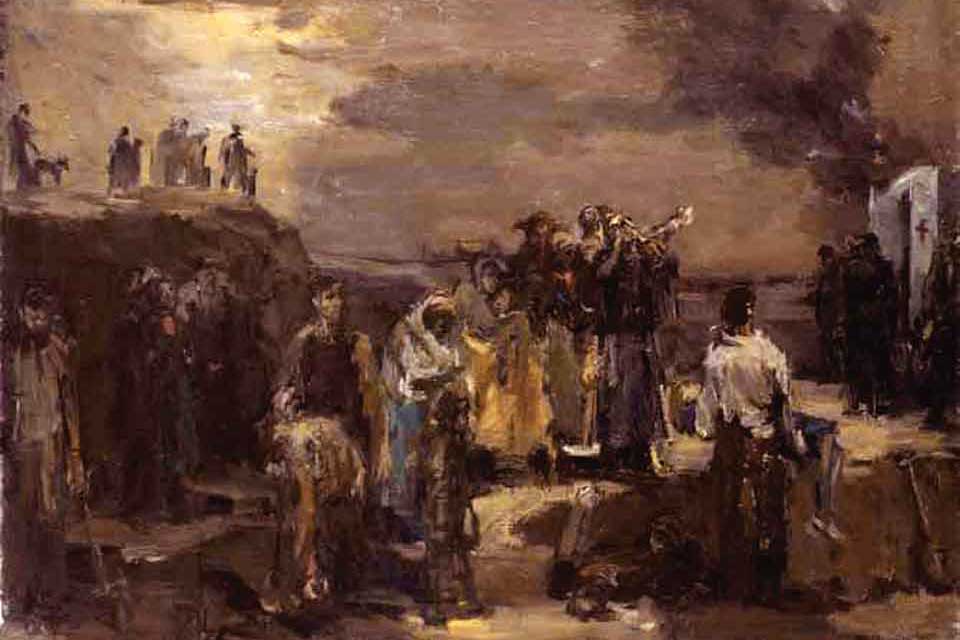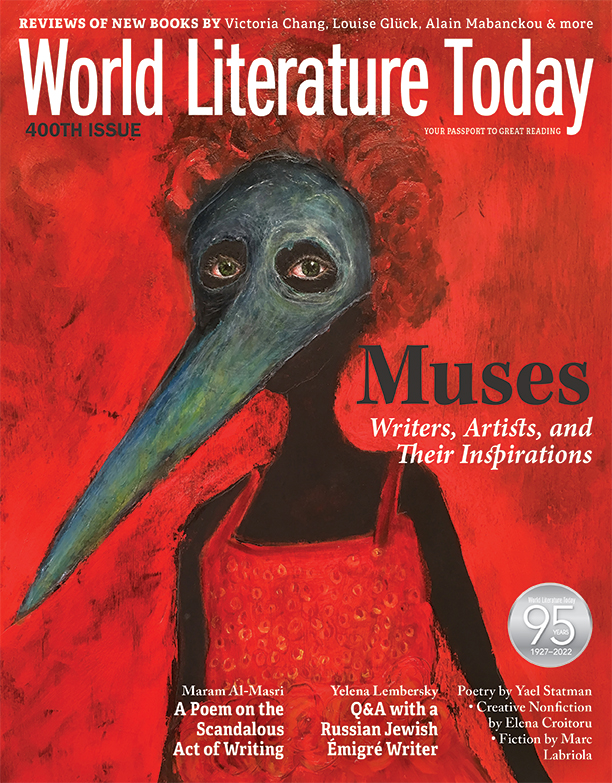Remembering the Final Years of Leningrad: A Conversation with Yelena Lembersky

Yelena Lembersky (b. 1969) grew up in Leningrad at a time when Jews were starting to leave for Israel or the United States—if they could get out. Soviet Jews had a special mark in their passports and were often fired from their jobs. Some were even sent to prison or the gulag like Lembersky’s mother. In Like a Drop of Ink in a Downpour: Memories of Soviet Russia (Cherry Orchard Books, 2022), Lembersky and her mother, Galina, wrote about these difficult times and the courage and risks it took to leave in 1987. I recently sat down with Lembersky over email to discuss Russian Jewish émigré literature, mother-daughter relationships, and finding purpose in the arts.
Susan Blumberg-Kason: Your grandmother told you at a young age that “words are silver, silence is gold.” She encouraged you not to share your family background, namely your parents’ fractured relationship. But this also applied to your family background. Your grandfather, Felix Lembersky, was a renowned painter and didn’t speak about losing his side of the family in a massacre in Ukraine. This was a part of the Holocaust that is not as known as the concentration camps in Germany and eastern Europe. In fact, your family didn’t talk about their Jewish background much at all. How did you and your mother decide to write a memoir about it, and was it difficult to come to this decision after so much was left unsaid during your childhood and before?
 Yelena Lembersky: Silence was survival in Soviet Russia. People were either snitches or those whom they watched. My mother grew up in a communal apartment where a neighbor down the hall was a police informant. So, her parents protected her by their silence. Years later she had to teach me to keep quiet. When she began to apply for emigration, we were constantly watched by the police. But my mother and I had no secrets from each other. So, yes, it was easy for us to write this memoir together.
Yelena Lembersky: Silence was survival in Soviet Russia. People were either snitches or those whom they watched. My mother grew up in a communal apartment where a neighbor down the hall was a police informant. So, her parents protected her by their silence. Years later she had to teach me to keep quiet. When she began to apply for emigration, we were constantly watched by the police. But my mother and I had no secrets from each other. So, yes, it was easy for us to write this memoir together.
Being a Jew could never be a secret in Russia. Soviet passports had a line for ethnicity. People of mixed ethnicities went by their father’s. I was considered to be a Russian even though I felt that I was a Jew, like my mother. But in Russo-centric society, you knew not to talk because you did not want to be judged through demeaning ethnic stereotypes.
Silence around the Holocaust came from a different place. My mother and I knew nothing about it. At home, we had the paintings titled Execution: Babyn Yar, by my grandfather, Felix Lembersky. My grandmother did not tell us what that meant. The Soviet government did not speak about the genocide of the Jews for political reasons. But my grandmother never talked about it even after she came to the United States.
It’s easier to be a hero than a victim. She told me about the Siege of Leningrad. During Nazi air raids, she stood guard on the roof of the Academy of Arts, where she was stationed, armed with a bucket of sand. Incendiary bombs fell, and she threw sand over them to keep the roof from catching fire. She was a petite woman, barely five feet tall, and had tremendous courage. And yet she never talked about the Holocaust. I think she did not want my mother and me to know that someone once thought our lives were not worth living.
During Nazi air raids, my grandmother stood guard on the roof of the Academy of Arts, where she was stationed, armed with a bucket of sand.
Blumberg-Kason: I always pause when I read about “Russian American” writers because so many are Jewish and certainly had a different experience in the Soviet Union, yet their Judaism is often erased from these references. A number of these authors like Gary Shteyngart, Boris Fishman, and Lara Vapnyar, among others, have written about the Russian Jewish immigrant experience in the US, but you center your book on your life in the Soviet Union. Have you thought about writing about your immigrant experience, or did you think about including it at the end of your memoir?

Lembersky: Yes! I wanted to begin this memoir with my arrival in Ann Arbor in 1987 and to somersault the story backward from the threshold of our new America. The first days of immigration are never easy, no. You lose your customs, your foods, your native language. Even body language becomes foreign. I took that chapter out. A different trajectory. Another book, perhaps.
There is a growing cohort of Russian émigré authors who write in English. I will add to your list Sophia Shalmiyev, Irina Mashinski, Elena Gorokhova, and Margarita Gokun Silver. Our stories are filtered through our multifocused lens. My writing is an amalgam of my blended experiences—as a Russian, a Jew, and an American. I am all three even when I write about Soviet Russia in the voice of a little girl.
I wrote the first draft of my memoir in Russian, translated it into English, and then continued back and forth in both languages. It is woven of the incongruities of Russian and American idioms and the impossibility of finding a perfect match in the other language. Russian is more fluid. Words can morph to express subtle tints of emotion. Objects come with linguistic gender, which prompts you to see things as living beings, an anthropomorphism. English is more orderly and precise. It takes discipline. I also studied Hebrew. And some German and French back in college. This ship moored in many harbors.
Blumberg-Kason: It’s interesting you mentioned Margarita Gokun Silver because I heard a podcast interview with her around the time your book came out, so very recently. That’s also fascinating about the linguistic differences between Russian and English. I also studied French in college, so we must have studied it around the same time since we’re the same age. That brings me to my next question. When you were living in Leningrad, I was a child in 1970s and ’80s America and learned in Sunday school about Jews in the Soviet Union. But it was a very vague education. It wasn’t that our teachers wanted to spare us the details of anti-Semitism, because we watched graphic footage of the Holocaust. Looking back, I wonder if my teachers had the whole story about Jews in the Soviet Union. When you arrived in Michigan in 1987 the year you turned eighteen, did you find that people there understood what you went through to get to the US?
Lembersky: When we just left Russia and came to Italy, a social worker from HIAS (Hebrew Immigration Aid Society), an American woman, asked me to name Jewish holidays. I only knew Simchat Torah. She said that I was not a Jew and should not be getting aid from her agency. When we arrived in the United States, just a few days later, we went to a synagogue, Temple Beth Israel, in Ann Arbor. The community welcomed us with open arms. They invited us to their homes and patiently listened to our tedious, slow, broken English. They collected money to help us buy furniture for our home. There was a dentist, Dr. Miller, who treated all Russian immigrants and didn’t take a penny for his work. I am infinitely grateful to all those people. They are some of the reasons I now volunteer in the Jewish community.
Misunderstanding? Of course! It’s natural. In the 1980s, everyone asked me if it was cold in Russia, if I drank vodka, and liked borscht. I tried to answer this in my memoir. In the 1990s, they asked about the Russian mafia. So, in this book, my mother and I write about corruption in the 1970s and ’80s, which set the stage for the kleptocracy of post-Soviet Russia.
In the 1980s, everyone asked me if it was cold in Russia, if I drank vodka, and liked borscht. I tried to answer this in my memoir.
Americans often correlate life in Russia with poverty and fear. That is wrong. Fear is transient. And freedom is relative. You can be free in captivity if you are free inside yourself. We turned to poetry, art, and music. We became more spiritual, even if a bit superstitious. We had our forests, hardy winters, sleds with long metal runners that went wicked fast down the hill. You could find wild strawberries in the meadow; they were smaller than a blueberry and tasted salty. I had a full life. I am grateful for all those gifts.
Blumberg-Kason: That last part sounds lovely. Your memoir isn’t just a traditional story of overcoming difficulty; it’s also interspersed with your mother’s own words. I couldn’t help but chuckle when your mother criticized your writing when she was in the gulag. Let’s just say that mothers are often like that, no matter where we live. So how was it to co-write this book with your mother?
Lembersky: Having two teenagers of my own, I still worry about them crossing the street. I can’t even begin to put myself in my mother’s place when she went to prison. She was innocent. I was eleven and left without a family. That happened in Leningrad, but it also happens in the US and all over the world. When mothers are incarcerated, their children become collateral damage.
In this memoir, we included letters my mother wrote to me from Krestí prison and women’s labor camp. She sent out a letter every few days. A warden read everything, so she had to choose her words carefully. But she felt the urgency to write to me because she didn’t know if she would ever see me again. She had to give me all her life lessons for the future.
Forty years later, I reread her letters and realized how much she carried me through that time of our separation, how much influence her words had on my life. I still follow the script that she gave me from prison. And oh, does she ever hold back her spelling and literary criticism!
In this memoir, we included letters my mother wrote to me from Krestí prison and women’s labor camp.
Blumberg-Kason: Your book also includes your mother’s poetry and some of your grandfather’s paintings, which add another layer to your story. I hadn’t realized it was all but impossible to take art out of the Soviet Union if it belonged to your family. Your mother and grandmother went through hoops to get permission to take your grandfather’s paintings to the US. Were you able to donate them to a museum? What became of them in the US?
Lembersky: My grandfather wanted his paintings to be in a museum where everyone could see them. My mother dreamt of having a museum dedicated to his art. I hope so. One day. All cannot be done in one generation. We have exhibited his work in the US and Europe. There are several books about him. His Execution: Babyn Yar paintings are historically significant. Created between 1944 and ’52, they are the earliest representation of the massacre and one of the earliest artistic images of Holocaust. My grandfather was raised in Berdychiv in Ukraine and educated in Kyiv. His Babyn Yar couldn’t be exhibited in the Soviet Union because the Soviets disallowed conversation around the Holocaust. Last year, I was working with the Babyn Yar Holocaust Memorial committee in Kyiv to exhibit Felix’s Babyn Yar paintings there. They tentatively planned to open that exhibition this spring. And now those people are fighting against Putin, who waves the Nazi card to drum up support for his despicable war. I hope these paintings will be on permanent display someday.
Blumberg-Kason: I teared up when I read about your flight departing Leningrad in 1987 and could picture that as a final scene in a movie. “The airplane starts moving, gains speed, and lifts off. Out the window, Leningrad retreats, gets smaller and smaller, and finally turns into a toy.” Have you been back to Saint Petersburg?
Lembersky: I have visited Saint Petersburg on Google Earth. Never went back. I left Leningrad. It’s a different city now. I have traveled to Israel, Hong Kong, China, and most European countries. I still want to go to India and Japan. I did go to Moscow once to meet the publishing team who worked on our monograph, Felix Lembersky: Paintings and Drawings. The Moscow subway was beautiful. Tsereteli’s monument to Peter the Great irked Muscovites, but I thought it was bold and original. I could have taken a train to Saint Petersburg. No, didn’t go back. Not yet.
Blumberg-Kason: I can understand how difficult that would be. I think your memoir is a means to going back in a way that is special and completely in your control. That’s the beauty of memoir. I’d like to return to something you mentioned above: “You can be free in captivity if you are free inside yourself.” I love how your mother writes about freedoms. “Every person has to find their own purpose. For some it is art, for others their family or the happiness around them. If the choices you make are not authentic to you, if you haven’t found your own truth—you will remain in a cage that you have created. You need to find your connection with your inner self.” I find this especially relevant during the pandemic. You studied art in Leningrad before you emigrated, but do you think writing is your purpose now, and do you have another book in the works?
Lembersky: I have to imagine a place before I describe it on paper. I have to see it in full detail, with textures and color, with shadows and light. I think this comes from starting off as an artist. Then writing is a pure joy. Time stops and I am suspended in that ethereal space between present and imagined. I think I feel most alive in those moments.
February 2022











